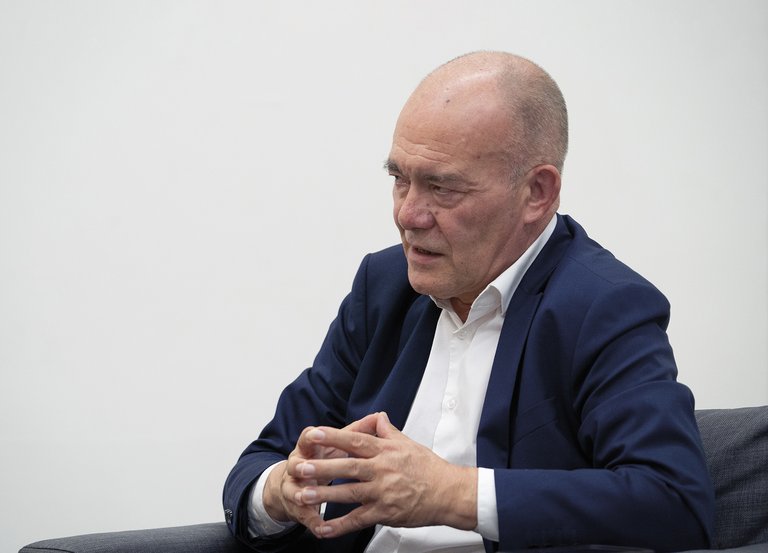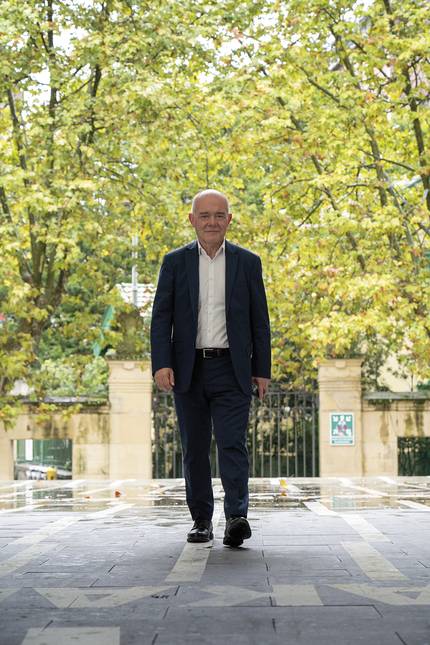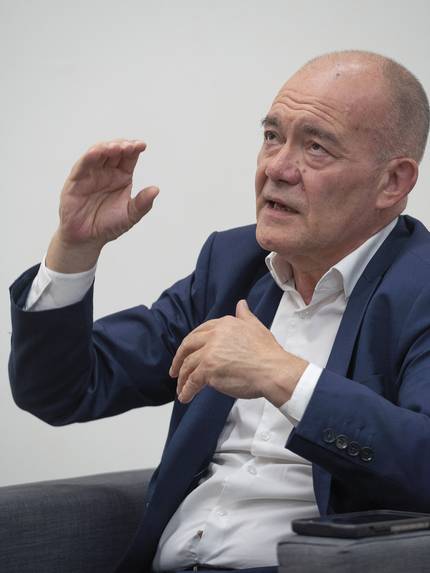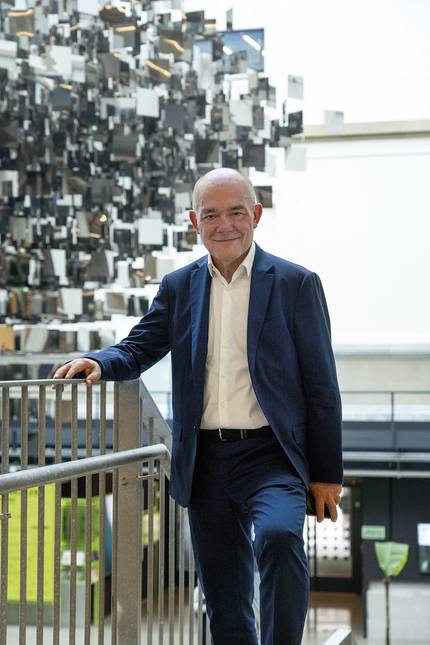“I would like to ensure the well-being of researchers and generate more disruptive discoveries.”
Juan Ignacio Pérez Iglesias (Salamanca, 1960) is not new to the readers of the magazine Elhuyar, since he has previously appeared in different pages in different roles: expert in physiology, university rector, informant and opinion giver... He is a doctor in biology and professor in physiology and has been rector of the University of the Basque Country, as well as responsible for the Chair of Scientific Culture of the same university. He is also a member of Jakiunde, and this year he has been appointed Minister of Science, University and Innovation of the Basque Government. He responds quickly and diligently to the request for dialogue and answers the questions without looking at the clock, in depth and with personal nuances.

What inspired you to take charge?
I've been in this world all my life with three stages. In the first stage I worked in research and teaching. Then in management at the UPV, first as vice-rector of the Basque language and then as rector. And then to socialize scientific knowledge, in the Chair of Scientific Culture. Therefore, when the President offered me this office, it seemed to me that he was taking on more responsibility than he had hitherto. I thought I couldn't say no.
In fact, I think it is significant that a department should be set up to deal with these issues. This indicates a purpose, a will to focus on this field. And if I make a contribution, I can do it there. If I had been offered any other department, I wouldn't have accepted it.
On this step-by-step route, have you already taken steps of this size before, or is this the largest?
It's a big jump for me. The trajectory so far has been gradual, and this is a leap, qualitatively very important.
Now that you've taken responsibility, I think you'll have very clear goals.
Yeah, but things never turn out the way you planned. When I started working, I saw that some ideas were not entirely correct and, on the other hand, I found other things that I did not expect, usually for the better. For example, I was previously unaware of the size of Ikerbasque, or the size of the projects in progress. Its size, not only in monetary terms, but also because of the strategic importance it can have, such as the Basque Quantum.
And did you find any gaps?
For example, I believe that the social sciences and humanities need more space. We already have a Science, Technology and Innovation Plan, which has many elements, but I believe that in some areas - and above all from the point of view of innovation - we need to give it a new coherence. In this respect, we must also consider the social sciences. For example, there are great opportunities for innovation in this plan, especially in relation to the company. For example, advanced manufacturing is explained, and I think it is normal, because this country is industrial. But that doesn’t have to mean putting others aside.
I'm talking about social innovation. This is already coming to us; since about 2020. Three transitions were diagnosed: the digital transition, the energy-climate transition and the social transition. And social transition is largely linked to demographic change: migration and ageing. From this point of view, society is unbalanced. There are related innovation policies, but they are not specifically linked to strategies in other areas. I think these things need a unified look.
And not just with the areas within the department, right? They should also be aligned with the strategies of other departments.
Oh, yes, of course. I’ve talked about the industry, and we have a relationship with the industry in many things. But also with the Department of Welfare, Youth and Demographic Challenge. In other words, it is up to us to manage the innovation fund, which puts us in charge of coordinating innovation policies, and ultimately government policies. Being in charge of coordination does not mean that we have to say what needs to be done, but it does mean that we have to give coherence to what is done.
You mentioned earlier that you shaped the initial ideas once you started working. But the main objectives have not changed. What are they?
As far as research is concerned, the situation in our Autonomous Community is quite satisfactory. We are making a great effort: we are already investing 2.2% of GDP, a little more. Scientific production is moderate, and we are neither further back nor further ahead. However, I would like to achieve what is called disruptive research. We should not give as much importance to the quantity of articles we produce, we should seek to have a disruptive nature. Qualitatively, we have to look for that leap.
What is the importance of research in this area?
The well-being of researchers is important in itself because it is fair to all people. I want to emphasize this because taking care of it is the responsibility of the person who governs it, not then taking advantage of it. But on top of that, I am convinced that if people are happy, they are in a better position to do their job properly. It’s not just to work harder; it’s to really have better ideas, to be more creative. Not to mention the first, which is basic. It is on our agenda; I spoke about it from the first moment in Parliament. And that’s where we want to make structural changes. Using terms from another field, we should be preventive. We should have a good working environment, and that has to do with other things, both material and non-material. That's what I'd like.
In the university area?
The goal is for the university to have the appropriate funding. And that has its knots. How much is the corresponding? I want to know the level of funding for both national and European universities, i.e. how much per student is private expenditure, how much is public expenditure. And I want to know what that has to do with each town's rent. We would need not only quantitative but also qualitative indicators to know what our context is.
We should decide where we should be located and, as important as that, how much we spend, and how much per student and per inhabitant. We need to look for efficiency.
Speaking of the university, to what extent should it prepare students for the job market?
It is not an easy question, and the answer is not obvious. It is very easy to say, on the one hand, that the university must prepare people well and that those who leave the university must be able to work with what they have learned there. No one would argue that. On the other hand, if you say that you have to prepare people to have training in their field of interest and to know more about it, no one would question that either. But here, I think the question is how far you want to go, one way or the other.
It seems to me that our system must offer both, that it must have two objectives, and also in a balanced way. I would say that you should not lose sight of the fact that students have to work at the end of the day and often live on what they have learned. But this should not lead to the university putting itself in the service of the labor market.
On the other hand, I think it is important to consider what we are good at at the local and university level. We need to know in which areas we really have a good standard, and that is what I think we need to teach. In addition, if another area is identified that needs to be strategically developed, a decision must be made.
It is also necessary to take into account what the students want, but there are some basic degrees that must be maintained, even if they receive few students.
The university must generate knowledge, cultivate knowledge in all fields. Maybe not in all disciplines, but at least in all branches.
Until recently, a minority had the opportunity to study at the university. Nowadays, it is common to enter the university after high school. What impact does this have on society?
This is very important. Look, in my family, we're the first. When I went to college, I think we'd be 10-15% of every generation out there somewhere. Today, 60% go to college. This has brought about a huge change and I do not know how far we are able to measure it.
We have another society. I am convinced that we have a more critical society, more enriching and demanding for this reason. There has been a major historic change, but in both directions. The university has changed as a result of the influx of so many people, and society has also changed.
And studies that were not previously university students have also been included in the university, and these studies have been given a different character. Some careers that used to have a much more professional touch now also have an academic foundation. It’s not just about showing how things are done, but also about teaching the essence of them. I believe that knowledge is now more complete and critical and, in that sense, better.
In this regard, you yourself have worked hard to enrich and strengthen this critical society through, for example, outreach. What is the importance of scientific integration?
Oh, yeah? Yeah. I don't see myself that way. Maybe seen from the outside... [It’s left to think] It’s true that I’ve been collaborating in all the media, even on TV... Well, yes, if you review it, it’s true that I’ve been working on it.
And how important is scientific inclusion? Well, it's very important, very important. When asked about it, my first answer is always the same: the main source of culture is the educational system, the school. Television, radio, the Internet and so on, but the main source is regulated education. In addition, it is proven; there are a lot of studies that show how the educational system influences society.
In Afghanistan, for example, girls have limited education.
When that happens, democracy disappears. One goes with the other. We need to be clear about this because we often forget it.
Disclosure, etc., are important, but they come later. The basic is the educational system. The others are important because they place high level knowledge in the public space; only what is seen is valued.
On the other hand, we must bear in mind that the authorities, so to speak, take decisions according to the minds of the citizens. So there's a cycle there. What does that mean? When knowledge is socialized, a vicious circle is activated, according to which scientific activity is finally promoted. And if scientific activity is promoted, society is more progressive, more advanced, more democratic and more cultured; and at the same time, knowledge is more socialized and therefore more visible.
And how can it be promoted?
First, we need to find out what's in it. I want to know what we do, what we do and what it is, what we lack, and how it is done, and what its consequences are. It's not easy to know. In fact, they will immediately begin to say, “but what audience does that have?” And that's not the point. So we have to make a diagnosis, after which we have to decide which lines to follow, how far we systematize and organize everything. And what incentives are needed to activate other wheels.
Do you want to add something? We've been doing it for a
long time... no, it's okay. And don’t worry, I like to talk about these things, I don’t get tired.
Buletina
Bidali zure helbide elektronikoa eta jaso asteroko buletina zure sarrera-ontzian











